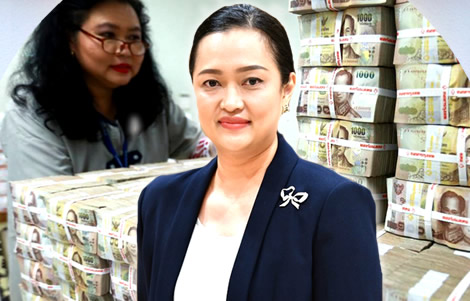Liquidity in the banking system decreased by 70% from May 2020 to March 2021 with the latest figures from the first quarter of this year showing that while overall bank deposits are up slightly, there are indications of a change in direction as economic analysts note corporate firms are using up bank deposits to pay for overheads and costs with lower incomes due to the ongoing contraction of the economy. This also coincides with a current account deficit for the kingdom in the first three months of 2021 of $6.1 billion or ฿191.11 billion amid rising capital outflows.
The Thai cabinet on Tuesday initiated moves to conserve funds as fears are growing the government may be facing a funding crisis over the coming six months with a simultaneous deterioration of the macroeconomic environment with plummeting domestic spending, cut off foreign tourism revenues and what appears to be diminishing liquidity in the financial system.

The Thai cabinet on Tuesday agreed to a range of measures which will effectively freeze programmes set up last year and funded by the government’s special ฿1 trillion loan facility.
It is a move which hints clearly the government may be facing a tightening financial situation driven by a deterioration in the economic outlook caused by a still worsening third virus wave of Covid-19.
The news comes amid heightened anxiety that the kingdoms’ strong financial position at the outset of this pandemic, which experts and rating agencies have consistently said can withstand any external shock, may be put to the test if the current trajectory continues.
Funding applications from state bodies and agencies to be withdrawn, projects with low disbursements to see budgets recouped by the exchequer
The decision, on Tuesday, means that project applications to the National Economic and Social Development Council (NESDC) under a social and economic rehabilitation programme will be withdrawn and the remaining funding will be reserved by the government to be redirected towards urgent efforts to counter the fast-spreading virus and assist areas in the country most at need.
It is understood that this will give the government access to ฿267 billion in funding that had not been approved for projects of which ฿265 billion is to be reserved for immediate application to assist those hardest hit by the third virus wave.
Recovery funds paired back by ฿45 billion
It is also understood that a budget of ฿400 billion to be advanced to a soft loans scheme to business and the Finance Ministry’s asset warehousing scheme has now also been paired back to ฿355 billion with ฿45 billion being redirected to efforts to assist the public.
The government is also asking state agencies and government departments to halt all projects where the total disbursement of approved budgets is below 10% and to send such funds back to the exchequer.
Rollout of soft loan fund already slowed down as efforts to refloat the economy are being slowly shelved in the face of uncertainty going forward
It is understood the disruption caused to the economy by the third wave has also slowed down the soft loan programme with reports, this week, indicating that 44% of hotels in Thailand were facing imminent closure in the next few months as promised lifelines dry up and the planned reopening of the country to foreign tourism becomes more uncertain.
Nevertheless, the growing financial pressure being faced by the government, right now, means that the need for the refloating of Thailand’s ฿2 trillion a year foreign tourism industry has never been more urgent and pressing.
Rising concern expressed about liquidity within the financial system as corporate firms use deposits to pay for costs and overheads with lower income
For the first time since the crisis began, there are also now rising concerns about liquidity in the financial system.
Kasikorn Research Center (K-Research) recently identified this when it pointed out that corporate deposits are declining as large firms are using their cash to pay overheads and costs while the level of bank deposits, although it did rise by 4.98% to ฿14.7 trillion at the end of the first quarter of 2021, was a rate of increase indicative of a reversal of the trend which can already be seen in corporate deposits.
‘Corporate deposits have been declining as business operators continue to rely on deposits to pay overhead, with their income down as a result of Covid-19,’ said Deputy Managing Director of the research institute, Thanyalak Vacharachaisurapol, in recent days.
The financial analyst explained that bank lending overall in 2021 has been dampened by the uncertainty and lack of clarity created by the third wave which erupted in the second quarter even as the first quarter of 2021 already showed a 1% contraction of GDP.
Fears of a lockdown in Bangkok if the outbreak is not contained as the disease hits the most marginalised
There are currently fears that despite the government’s best efforts, it may be forced into implementing a full lockdown of Bangkok as the crisis there is still worsening.
The spread of the disease in Bangkok is being fanned by the infection of concentrated populations living in close proximity as the disease has now taken hold among the less well off in the metropolis.
The bad news is coming as government tax revenues have fallen significantly by 4.9% in the first quarter of 2021 followed by a sharp 31.1% in the second quarter so far.
Government may face a credit crunch in the 3rd quarter but on a wider scale, there may also be an impending lack of liquidity in the financial system
The fear that is dawning on some observers, right now, is that not only will the government be facing a credit crunch or financial crisis but that also the wider financial system may find itself short of liquidity sometime during 2021.
Thailand’s debt as announced by the Finance Ministry at the end of February was 53.3% of GDP which in itself showed that that public debt has risen from 43% at the outset of this crisis.
This left the kingdom with a budget deficit of ฿521 billion in March with a legal limit as prescribed by the law of ฿720 billion.
Government may have to breach the borrowing limit
Economic forecasters are surmising that the government will need to raise extra funds in the period from July to September 2021 which is the end of the fiscal year.
It certainly explains why the government is acting to conserve unspent funds and budgets at this point.
This could also have political implications if the government attempts to breach its borrowing limit of 60% of GDP.
Outside of this, the macroeconomic picture for the government is also deteriorating with a darker outlook.
Thailand’s balance of payments for the first quarter of 2021 showed a deficit of $6.1 billion driven primarily by the absence of foreign tourism earnings.
Liquidity decreased by over 70% since May 2020 as government borrowing requirement looks set to surge with sharp drops in revenue and need for supports
One economic forecaster has shown that large capital outflows from the kingdom have begun which is already impacting liquidity in the financial system.
This also serves as an explanation for lower deposit rate gaps between long term and short term deposits.
In May 2020, the financial system had excess liquidity of up to ฿823 billion which had fallen to ฿243 billion by the end of March 2021 even before the third wave crisis erupted.
Even if the Thai government does decide to increase its legally capped borrowing limit, it will require upwards of ฿400 billion alone in the third quarter or last quarter of the fiscal year to pay for an ongoing budget deficit, assuming that revenues do not deteriorate further, and further relief measures to support those hardest hit by the still rising third wave of infection which saw no less than 4,000 cases reported alone on Thursday.
This spells a credit crunch within the financial system unless there are strong capital inflows and a boost to the government’s finances.
Soft loan programme and asset warehousing plan may be easy pickings and could be dismembered
One source, perhaps easy pickings for a government in need, may be the slow dismembering of the soft loan package earmarked for SMEs and the corporate sector where ฿250 billion is still apportioned.
Banks are already reported to be slow at rolling out the programme due to the economic uncertainty.
Another target may be the asset warehousing scheme which would have a devastating impact on plans to reestablish and refloat the foreign tourism industry and thousands of firms currently in a state of distress, nearly all of who lost all their reserves and are currently being left with their tails to the wind.
Hence the basis for reports that so many are right now facing imminent closure.
Only bright spot is a strong export performance, it may not be enough to produce the hard cash needed
The only positive for the government, at this time, is a pick up in exports from the kingdom but this will not be enough to address the liquidity crisis that may be unfolding or to offset the damage being caused by what is expected to be a severe drop in domestic spending and the continued absence of foreign tourism income costing Thailand ฿166 billion a month in lost revenue.
The government, perhaps quite rightly, is focusing presently on the need to fight the virus outbreak and alleviate the impact on the poor but beyond that, it may have to prioritise the vaccination campaign at all costs to stabilise the situation and possibly manage the reopening of the kingdom to foreign tourism and the now critical inward flow of funds that spring from it.
Join the Thai News forum, follow Thai Examiner on Facebook here
Receive all our stories as they come out on Telegram here
Follow Thai Examiner here
Further reading:
3rd virus wave now spells not just economic loss but financial danger as kingdom’s debt level rises
Still time to avoid lockdown says Health Minister as 3rd virus wave dwarfs all infections to date
Thai economy is still in reverse despite rising confidence and a virus threatening a 3rd wave
Reopening of Phuket still not officially approved although it is the ideal test for a broader move
Minister urged not to be afraid to borrow in 2021 as fears grow for a quick foreign tourism revival
Economy to rebound as the year progresses driven by exports and a return of mass foreign tourism
Door closing on quick foreign tourism return as economic recovery is delayed to the end of 2022
Fact – only 6,556 visitors arrived in Thailand last month compared to 3.95 million in December 2019
Desperate foreign tourism business concerns are clinging to straws as they try to survive the crisis
Finance Minister says economy must pivot away from tourism with a switch to S-Curve industries
Strengthening baht predicted as investors bet on a reopening of Thailand to mass tourism in 2021
World’s biggest free trade deal just signed will be a huge boost for the Thai economy and exports
RCEP deal agreed as India opts out – busy Bangkok ASEAN summit concludes on a low key
Thailand’s economy has become dependent on government expenditure to stay above water
Thailand and US aim for a new more ‘proactive’ trading relationship as ambassador meets Prayuth
Rice price spike but drought conditions to recede – security concern for the Mekong river


















